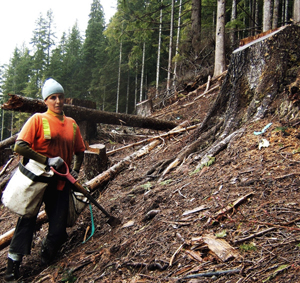
- Eating Dirt: Deep Forests, Big Timber and Life with the Tree-Planting Tribe
- Greystone Books and David Suzuki Foundation (2011)
If you're a part of the tribe, you know. Maybe you miss the freedom, the dependable cash flow, the wilderness air -- even the look of the cut blocks themselves, sheathed off mountainsides like dog fur. Maybe it was the all-day, all-night whiskey-induced shenanigans (and ensuing "bush goggles") that kept you coming back each year.
It's a wholly physical and dirty job, often excruciatingly so. And by the end of the season, the rest of the tribe has seen the absolute worst in you. Fortunately, cussing is the tribe's native language. Being crude wins you bonus points. No disgusting personal trait matters, as long as you can plant trees.
"Earning our keep can feel like picking quarters off a sidewalk, and it can feel like an emergency," writes Charlotte Gill, in her new book Eating Dirt: Deep Forests, Big Timber, and Life with the Tree-Planting Tribe.
It's a job with an ugly underbelly, the result of years of forests unthinkingly flattened. It's been a job for misfits, prisoners, and relief camp workers. (In the U.S., as Gill details, tree-planting is largely done by Pineros: uninsured, Mexican migrant workers that experience no end of occupational abuse.) But it was also a job that, despite its grueling pace and challenging conditions, kept the author going back for 20 years.
"We know how to climb landslides. How to walk on the guts of the earth so that our feet never touch the ground. We know how to hang on by the fingernails and toe spikes. We know how to fall down backward and forward and also how to get up. Where will we take these skills at the end of our tenure? When we quit this miserable, beautiful life," she writes.
The 'we' of tree-planting
Gill uses the first-person plural perspective, "we", instead of "I" throughout the book. In a recent interview with the Tyee, Gill explained that "... it allowed me to tell a big story and a little story at the same time. Memoir is often touted as the writing of an extraordinary experience, but my favorite authors have magical ways of capturing the transcendent moments in everyday life. I was less interested in my own superlative anecdotes than I was in the regular experiences of many people."
The Tyee asked Gill about her writing process for this book. "After I'd been planting trees for about ten years, I got it in my head to write about it. For authors, I've heard it said, writing is a way of making sense of experience, and that was true for me. That sweaty, dirty, buggy job was such a big part of my life. I kept a journal when I was out planting but I only formally wrote about the subject during the winter off-season. I think that's partly why I did so long. It was my day job. It allowed me to have several uninterrupted months at the desk. It took me about six years to write Eating Dirt. I'm a terribly slow writer. It seems all the cells in my body need to be replaced between books."
Those six years of careful writing and revising paid off, however, in the resulting clarity and elegance of Eating Dirt's prose:
"I planted trees at the edge of the northern prairie, in the neighbourhoods of pump jacks and gas wells... I planted the remnants of old forest fires, working among scorched trunks that covered the hills like matchsticks... I pass through whole forests turned brassy by the mountain pine beetle, an insect that travels in biblical clouds like black sesames tossed up in the air," she writes.
But Eating Dirt is much more than a memoir about tree-planting. Even if you've never planted anything more than a few tulip bulbs in your life, Gill's book still provides fascinating reading. The book is a love song for parts of our province rarely seen, and the tale of the six billion trees planted in B.C. -- enough to replant an area "roughly the size of Sri Lanka," Gill points out.
'Just a storyteller'
Eating Dirt brims with vivid, beautifully rendered passages about the larger picture -- about an ecosystem in which forests are an integral part, how forests developed eons ago from blue green algae, single-celled plant life, into lush forests covering every continent, and how civilizations rose and fell according to how they exploited their forests, from the Fertile Crescent to North America.
One passage sets out the historical role of religion in justifying human dominion over nature, discussing how human beings have become "biological capitalists" who have viewed the world's forests as an endless resource to exploit. The Tyee asked Gill if she believed human beings are doomed to the fate of past civilizations that over-exploited their forests, grew dependent and weakened as a result, and then disappeared. If we've reached peak oil, have we reached the same with our forests?
"I'm just a tree-planter and a storyteller, certainly not a scientist or an expert. But as far as I can tell after several years of immersion in the topic, deforestation has always gone hand in hand with civilization. The removal of planetary forests is the cost of the human diaspora. For most of our history, it's seemed like a worthwhile price to pay for warmth, cooked food, light and shelter.
"I can't see that we'll stop logging any time soon. We make a thousand things out of trees. But we're down to one-third of the primary forests around the world. Most of the ancient timberlands that grew up after the last glaciation, these have been cut. We're custodians of a significant chunk of those frontier forests in Canada. If only we could see and appreciate all the things these trees do for us. We might consider slowing the pace of our appetites."
Layers upon layers
Eating Dirt shows that what occurs underneath an old growth forest canopy cannot be replicated: "Human hands can replace the trees but not necessarily the forest," Gill writes. "An ancient forest is a life-giving environment, like a coral reef or a wetland where creatures flock to find shelter and nourishment. It's a biome defined by relationships -- complexly layered, synergistic webs continuing millions of organisms for every acre of space... Inside the apparent chaos is a precise and intricate order. Every plant, animal and microorganism submits to a bio-evolutionary compact that equalizes rates of birth and death, immigration and the evolution of old species into new ones. Countless beings dovetail together into limited space while sharing finite resources. This is biodiversity."
In the book, Gill describes how cones fall close to the parent tree, and germinate under the cover of older trees, protected from the elements. Generations of trees overlap, providing habitat, nourishing the soil, preventing soil erosion and landslides, trapping carbon dioxide, and moderating climates. As Gill writes, "Tree communities were never designed to arise from bare earth. In this sense a forest is a prerequisite for itself."
Over her two decades of tree-planting, Gill noticed changes in the scale, scope and nature of the clear cuts and in the approaches to reforestation. She told the Tyee that there is some evidence of "... a movement towards minimal disturbance, towards working with the landscape." But who can know whether that movement will stave off the eventual demise of our primordial forests, or if it will end up being too little, too late?
Knee injuries may have prevented Gill (who currently teaches part-time at UBC) from continuing to work as a tree-planter, but her book, Eating Dirt, will endure as a testament to the vital but often overlooked actual and symbolic role that forests, tree-planters and tree-planting continue to play in our times.
As for advice for potential tree planters, she offers these key words: "Helly Hansen stretch rainwear. A Vector Bar in the back bag. Bag Balm for the cracked fingers. And may The Force be with you."
Charlotte Gill's Eating Dirt was recently shortlisted for the Hilary Weston Writers' Trust Prize. Her short story collection Ladykiller was a finalist for the Governor General's Literary Award for fiction and winner of the Danuta Gleed Award and the B.C. Book Prize for fiction.
[See more Tyee stories in: Labour.] ![]()
Read more: Labour + Industry
















Tyee Commenting Guidelines
Comments that violate guidelines risk being deleted, and violations may result in a temporary or permanent user ban. Maintain the spirit of good conversation to stay in the discussion.
*Please note The Tyee is not a forum for spreading misinformation about COVID-19, denying its existence or minimizing its risk to public health.
Do:
Do not: